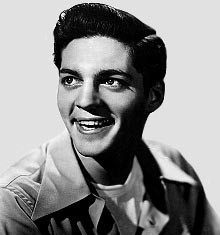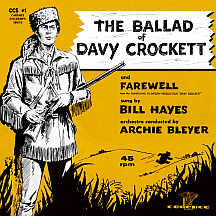BILL HAYES
The Ballad of Davy Crockett
The word "legendary" has too frequently been used to describe living people unworthy of the term (if the "Legend of Sleepy Hollow" was alive and living on your street, would he/it really be a legend?), yet real-life heroes of American history have been known to achieve such mythic status. Take the case of Davy Crockett: many (sometimes embellished) stories are passed down about the mountain man-turned-political figure-turned-war hero. His lifetime spanned just under a half-century from 1786 to 1836; as a youngster in Greene County, Tennessee, he learned to shoot a rifle and later fought in the War of 1812, battled hostile Indian tribes, served two terms in the U.S. House of Representatives and ultimately gave his life fighting the battle of the Alamo in San Antonio, Texas. His image as one of our nation's great heroes grew larger as the years passed.
Slightly more than 90 years after Crockett's death, Bill Hayes was born into a family of musicians in Harvey, Illinois. He made his public debut playing fiddle in high school shows; in 1949, after finishing a stint in the Navy, he signed on as a singer for Funzapoppin', a musical revue created by the comedy team of Ole Olsen and Chic Johnson. The following year he broke into television as a regular on Your Show of Shows, an extremely popular live variety series starring Sid Caesar and Imogene Coca that aired Saturday evenings on NBC. Hayes remained with the series through most of its four-year run and smoothly transitioned to stage musicals, beginning with Richard Rodgers and Oscar Hammerstein's 1953 Broadway hit Me and Juliet. He'd recorded for MGM Records since '51, but his releases (mainly covers of other artists' hits like "Charmaine" and "High Noon") sold way below expectations. Then the situation improved when he ran into Cadence Records owner Archie Bleyer.
During the first season of Walt Disney's hourlong Disneyland progam, which premiered in October 1954 on ABC, there were episodes associated with the theme park's various sections (though Disneyland itself wasn't completed and wouldn't be open for business at its Anaheim, California location until the following July). Some shows were presented under the banners of Fantasyland, Tomorrowland, Adventureland or Frontierland, the latter tying in to a series of Crockett episodes starring Texas-born actor Fess Parker, a former college athlete who'd had several small parts in movies and TV before being tapped by Walt for the first of two similar roles that defined his career. Davy Crockett, Indian Fighter aired December 15, 1954, setting off a coonskin cap-wearing craze among young boys who idolized the rugged hero portrayed by Parker.
A pair of young songwriters, George Bruns and Tom Blackburn, were hired by Disney to compose a theme for the series. As soon as the episode aired, Bleyer produced "The Ballad of Davy Crockett" in his New York studio with vocalist Hayes stretching the truth per Blackburn's words: 'Raised in the woods so's he knew ev'ry tree...an' kilt him a b'ar when he was only three...Davy...Davy Crockett, the king of the wild frontier...' Archie and Bill recorded the song in one take...or so the legend goes. The single was released around the time a second Disney episode, Davy Crockett Goes to Congress, aired in January '56. Other versions of the song appeared, starting with Fess Parker's soundtrack recording for Columbia (he gave the tune a more rural feel, pronouncing the first word in the line 'Born on a mountaintop in Tennessee' as 'born'd'). "Tennessee" Ernie Ford covered it for Capitol Records as nearly every big record label threw their coonskins into the ring: Burl Ives did it for Decca in addition to Rusty Draper (Mercury), Mac Wiseman (Dot), Steve Allen (Coral) and others. There were various children's editions, and while a Jewish novelty version would seem unnecessary, that didn't stop funnyman Micky Katz from recycling every conceivable Yiddish cliché on his Capitol single "Duvid Crockett."
Hayes had gotten a jump on the competition; in March, with Parker and Ford right behind, he began a five-week stay at number one on the charts. These top-selling "Davy" discs spent nine weeks together in the top ten of Billboard's Best Selling Singles, covering all of April and May '55. While a triple-takeover like this is a rare occurrence, another such example happened at the same time: for three weeks in May, they were joined by the Les Baxter, Al Hibbler and Roy Hamilton recordings of "Unchained Melody." Just two songs hogging six slots in the top ten! Meanwhile a choral group, The Voices of Walter Schumann, released two "Crockett" records, reaching the top 30 with the original song, then following it with "Old Betsy (Davy Crockett's Gun)," penned by Bruns and lyricist Gil George. Others did the sequel as well; Parker's was titled "Old Betsy (Davy Crockett's Rifle)."
Crockett headlined three more episodes of the Disneyland series (with scripts by Blackburn, who'd also supplied seemingly endless lyrics to the song, often tailored to the storyline of each episode or scene), wrapping up in December with Davy Crockett and the River Pirates. The five episodes were re-edited and released as two theatrical films, one in '55 and the other in the summer of '56, by which time the coonskin cap trend was beginning to wind down and Disney was preparing new, but similar, projects for Parker and the Crockett creative team.

It was back to recording ballads for Bill, but that idea didn't fly. Another TV tie-in was attempted in late '55 with "The Legend of Wyatt Earp," a softly-rendered theme for ABC's western series starring Hugh O'Brian. "Das Ist Musik," a mid-'56 novelty song ("with some appropriate comments and singing by Misty Maughn," as noted on the label), fell short as did his best attempt at rock and roll, "Message from James Dean (Danger, Danger, Danger)," an early example of the "death song" car-crash trend. The track is deserving of more attention today, but at the time it may have come on a bit too strong for Dean's many fans still in mourning a year after the ultra-cool actor's death.
Bill left Cadence for ABC-Paramount in early 1957. Suddenly he was in competition again with Fess Parker, star of Disney's latest, Westward Ho the Wagons!, as both were climbing the charts with a song from the film, "Wringle, Wrangle" (penned by Stan Jones, best-known for the late-'40s smash "(Ghost) Riders in the Sky"). This time Parker came out ahead, nearly making the top ten, while Hayes managed a respectable top 40 showing, both avoiding a "one-hit" reputation. Neither was able to extend his string, but both had further success as actors. Parker altered his Crockett persona slightly and, as Daniel Boone, reaped the benefits of weekly small screen exposure from 1964 to 1970. Hayes' career, on the other hand, lasted much, much longer. He remained with ABC-Paramount a mere year (turning out a pair of decent rock singles, "Ramshakle Daddy" and "Bop Boy"), sang on many TV variety shows and recorded love songs at Kapp, varying his approach with a cool, near-wordless '59 rendition of "Wimoweh" backed by The Buckle Busters. In the 1960s, Bill focused on acting and made a number of television and film appearances (best among them: The Cardinal in 1963) while maintaining steady employment in stage shows (receiving critical praise in touring versions of Broadway shows like Bye Bye Birdie).
In 1972 he joined the cast of NBC-TV's daytime soap Days of Our Lives and found himself back in the spotlight in the role of Doug Williams, who became romantically involved with Julie Olson (played by Susan Seaforth, who'd been on Days since '68), then married her, on the series and in real life (after which she became Julie Olson Williams on the show and Susan Seaforth Hayes the other 23 hours of each day). The couple was so popular they appeared on the cover of Time magazine in January 1976, a distinction unheard-of among soap stars before or since. Susan and Bill Hayes have been happily inseparable in the intervening years while continuing as regulars on DOOL into the 2020s. Combined, that's one full century...gotta be some kind of unsurpassable record!


